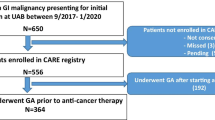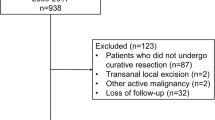Abstract
Background
The incidence of colorectal cancer (CRC) is highest among the elderly. An important treatment modality is surgery. After surgery, due to poor functional recovery, some elderly have an increased risk for complications and prolonged length of hospital stay (LOS). Preoperative elevated levels of fatigue and impaired functioning in instrumental activities of daily living (iADL) might be associated with these outcomes, and may, therefore, be helpful to recognize patients with elevated risk for complications or prolonged LOS, who should undergo more thorough functional assessment.
Aims
This exploratory study aims to assess whether physical fatigue, reduced activity and/or iADL, assessed preoperatively, are associated with postoperative complications and prolonged LOS, in elderly patients undergoing surgery for CRC.
Methods
We performed an exploratory prospective study in older (≥ 65 years) patients (n = 57) who were scheduled to undergo elective surgery for colorectal cancer. Fatigue and iADL functioning were assessed with questionnaires. Multivariable regression analyses were used to examine the relationship of fatigue and iADL with complications and LOS.
Results
IADL was not associated with complications or LOS. Fatigue was not associated with complications. Patients with higher fatigue had increased LOS in the univariable analyses but not in the multivariable analyses after adjustment for nutritional status and neoadjuvant treatment.
Discussion
We found that fatigue was associated with increased LOS in the univariable analysis. The results from the multivariable analysis and path analysis indicate, however, that this is likely not a causal relationship; the observed relationship between physical fatigue and LOS appears to be confounded by nutritional status and by having received neoadjuvant treatment.
Conclusions
Although fatigue is a predictor for increased LOS, assessment of fatigue and iADL has no additional value for identifying elderly at risk for poor functional outcome after CRC surgery.


Similar content being viewed by others
References
The Netherlands Cancer Registry (NKR) (2018) https://www.cijfersoverkanker.nl/home-36.html
Benson AB, Venook AP, Al-Hawary MM et al (2018) Rectal cancer, version 2.2018, NCCN clinical practice guidelines in oncology. J Natl Compr Canc Netw 16(7):874–901. https://doi.org/10.6004/jnccn.2018.0061
Benson AB, Venook AP, Cederquist L et al (2018) Colon cancer, version 2.2018. NCCN Clin Pract Guidel Oncol 15:370–398. https://doi.org/10.6004/jnccn.2017.0036
Bertelsen CA, Neuenschwander AU, Jansen JE et al (2015) Disease-free survival after complete mesocolic excision compared with conventional colon cancer surgery: a retrospective, population-based study. Lancet 16:161–168. https://doi.org/10.1016/s1470-2045(14)71168-4
MacFarlane JK, Ryall RD, Heald RJ (1993) Mesorectal excision for rectal cancer. Lancet 341:457–460
Hamaker ME, Prins MC, Schiphorst AH et al (2015) Long-term changes in physical capacity after colorectal cancer treatment. J Geriatr Oncol 6:153–164. https://doi.org/10.1016/j.jgo.2014.10.001
Emily F, Shoujun Z, John BW et al (2012) Functional status after colon cancer surgery in elderly nursing home residents. J Am Geriatr Soc 60:967–973. https://doi.org/10.1111/j.1532-5415.2012.03915.x
Kristjansson SR, Nesbakken A, Jordhøy MS et al (2010) Comprehensive geriatric assessment can predict complications in elderly patients after elective surgery for colorectal cancer: A prospective observational cohort study 76:208–217. https://doi.org/10.1016/j.critrevonc.2009.11.002
Ronning B, Wyller TB, Jordhoy MS et al (2014) Frailty indicators and functional status in older patients after colorectal cancer surgery. J Geriatr Oncol 5:26–32
Tan KY, Kawamura YJ, Tokomitsu A et al (2012) Assessment for frailty is useful for predicting morbidity in elderly patients undergoing colorectal cancer resection whose comorbidities are already optimized. Am J Surg 204:139–143. https://doi.org/10.1016/j.amjsurg.2011.08.012
Khuri SF, Henderson WG, DePalma RG et al (2005) Determinants of long-term survival after major surgery and the adverse effect of postoperative complications. Ann Surg 242:3
Tahiri M, Sikder T, Maimon G et al (2016) The impact of postoperative complications on the recovery of elderly surgical patients. Surg Endosc 30:1762–1770. https://doi.org/10.1007/s00464-015-4440-2
Nathan H, Atoria CL, Bach PB et al (2015) Hospital volume, complications, and cost of cancer surgery in the elderly. J Clin Oncol 33:107–114. https://doi.org/10.1200/JCO.2014.57.7155
Ellis G, Whitehead MA, O’Neill D et al (2011) Comprehensive geriatric assessment for older adults admitted to hospital. BMJ. https://doi.org/10.1002/14651858.cd006211.pub2
Kristjansson SR, Nesbakken A, Jordhøy MS et al (2010) Comprehensive geriatric assessment can predict complications in elderly patients after elective surgery for colorectal cancer: a prospective observational cohort study. Crit Rev Oncol 76:208–217
Feng MA, McMillan DT, Crowell K et al (2015) Geriatric assessment in surgical oncology: a systematic review. J Surg Res 193:265–272. https://doi.org/10.1016/j.jss.2014.07.004
Hamaker ME, Jonker JM, de Rooij SE et al (2012) Frailty screening methods for predicting outcome of a comprehensive geriatric assessment in elderly patients with cancer: a systematic review. Lancet Oncol 13:e444. https://doi.org/10.1016/s1470-2045(12)70259-0
Kristjansson SR, Rønning B, Hurria A et al (2012) A comparison of two pre-operative frailty measures in older surgical cancer patients. J Geriatric Oncol 3:1–7. https://doi.org/10.1016/j.jgo.2011.09.002
Berger AM, Mooney K, Banerjee C et al (2018) Cancer-related fatigue, NCCN clinical practice guidelines in oncology, version 2.2018
Smets EM, Garssen B, Bonke B et al (1995) The Multidimensional Fatigue Inventory (MFI) psychometric qualities of an instrument to assess fatigue. J Psychosom Res 39:315–325
Heldens A, Bongers BC, Lenssen AF et al (2017) The association between performance parameters of physical fitness and postoperative outcomes in patients undergoing colorectal surgery: an evaluation of care data. Eur J Surg Oncol. https://doi.org/10.1016/j.ejso.2017.08.012
Lau KM, Parikh M, Harvey DJ et al (2015) Early cognitively based functional limitations predict loss of independence in instrumental activities of daily living in older adults. J Int Neuropsychol Soc 21:688–698. https://doi.org/10.1017/S1355617715000818
Audisio RA, Gennari R, Sunouchi K et al (2003) Preoperative assessment of cancer in elderly patients: a pilot study. Support Cancer Ther 1:55–60. https://doi.org/10.3816/sct.2003.n.005
Kristjansson SR, Jordhøy MS, Nesbakken A et al (2010) Which elements of a comprehensive geriatric assessment (CGA) predict post-operative complications and early mortality after colorectal cancer surgery? J Geriatr Oncol 1:57–65. https://doi.org/10.1016/j.jgo.2010.06.001
Kothari A, Phillips S, Bretl T et al (2011) Components of geriatric assessments predict thoracic surgery outcomes. J Surg Res 166:5–13. https://doi.org/10.1016/j.jss.2010.05.050
Smets EM, Garssen B, Cull A et al (1996) Application of the multidimensional fatigue inventory (MFI-20) in cancer patients receiving radiotherapy. Br J Cancer 73:241–245
Lawton MP, Brody EM (1969) Assessment of older people: self-maintaining and instrumental activities of daily living. Gerontologist 9:179–186
Edwards MM (1990) The reliability and validity of self-report activities of daily living scales. Can J Occup Ther 57:273–278. https://doi.org/10.1177/000841749005700507
Charlson ME, Pompei P, Ales KL et al (2003) A new method of classifying prognostic comorbidity in longitudinal studies: development and validation. J Chron Dis 40:373–383. https://doi.org/10.1016/0021-9681(87)90171-8
Roffman CE, Buchanan J, Allison GT (2016) Charlson comorbidities index. J Physiother 62(3):171. https://doi.org/10.1016/j.jphys.2016.05.008
Tian Y, Xu B, Yu G et al (2017) Age-adjusted charlson comorbidity index score as predictor of prolonged postoperative ileus in patients with colorectal cancer who underwent surgical resection 8:20794–20801. https://doi.org/10.18632/oncotarget.15285
Krarup PM, Nordholm-Carstensen A, Jorgensen LN et al (2015) Association of comorbidity with anastomotic leak, 30-day mortality, and length of stay in elective surgery for colonic cancer: a nationwide cohort study. Dis Colon Rectum 58:668–676. https://doi.org/10.1097/DCR.0000000000000392
Carlomagno N, Santangelo ML, Amato B et al (2014) Total colectomy for cancer: analysis of factors linked to patients’ age. Int J Surg 12(Suppl 2):S139
Dindo D, Demartines N, Clavien PA (2004) Classification of surgical complications: a new proposal with evaluation in a cohort of 6336 patients and results of a survey. Ann Surg 240:205–213
Duraes LC, Stocchi L, Steele SR et al (2018) The relationship between Clavien–Dindo morbidity classification and oncologic outcomes after colorectal cancer resection. Ann Surg Oncol 25:188–196
Streiner DL (2005) Finding our way: an introduction to path analysis. Can J Psychiatry 50:115–122. https://doi.org/10.1177/070674370505000207
Schumacker RE, Lomax RG (2008) A beginner’s guide to structural equation modeling. Lawrence Erlbaum Associates, Mahway
Hooper D, Coughlan J, Muller MR (2008) Structural equation modelling: guidelines for determining model fit. Electron J Bus Res Methods 6:53–60
Rosseel Y (2012) lavaan: an R package for structural equation modeling. J Stat Softw 48(2). https://doi.org/10.18637/jss.v048.i02
Guinan EM, Doyle SL, Bennett AE et al (2018) Sarcopenia during neoadjuvant therapy for oesophageal cancer: characterising the impact on muscle strength and physical performance. Support Care Cancer 26:1569–1576
Fukuse T, Satoda N, Hijiya K et al (2005) Importance of a comprehensive geriatric assessment in prediction of complications following thoracic surgery in elderly patients. Chest 127:886–891
Fagard K, Casaer J, Wolthuis A et al (2017) Value of geriatric screening and assessment in predicting postoperative complications in patients older than 70 years undergoing surgery for colorectal cancer. J Geriatr Oncol 8:320–327. https://doi.org/10.1016/j.jgo.2017.07.008
Bennedsen ALB, Eriksen JR, Gögenur I (2018) Prolonged hospital stay and readmission rate in an enhanced recovery after surgery cohort undergoing colorectal cancer surgery. Colorectal Dis 20:1097–1108. https://doi.org/10.1111/codi.14446
Samuelsson KS, Egenvall M, Klarin I et al (2019) Preoperative geriatric assessment and follow-up of patients older than 75 years undergoing elective surgery for suspected colorectal cancer. J Geriatr Oncol. https://doi.org/10.1016/j.jgo.2019.01.020
Seretis C, Kaisari P, Wanigasooriya K et al (2018) Malnutrition is associated with adverse postoperative outcome in patients undergoing elective colorectal cancer resections. J BUON 23:36–41
Biolo G, Cederholm T, Muscaritoli M (2014) Muscle contractile and metabolic dysfunction is a common feature of sarcopenia of aging and chronic diseases: from sarcopenic obesity to cachexia. Clin Nutr 33:737–748. https://doi.org/10.1016/j.clnu.2014.03.007
Murthy VH, Krumholz HM, Gross CP (2004) Participation in cancer clinical trials: race-, sex-, and age-based disparities. JAMA 291:2720–2726. https://doi.org/10.1001/jama.291.22.2720
Mokutani Y, Mizushima T, Yamasaki M et al (2016) Prediction of postoperative complications following elective surgery in elderly patients with colorectal cancer using the comprehensive geriatric assessment. Dig Surg 33:470–477
Ghoneim MM, O’Hara MW (2016) Depression and postoperative complications: an overview. BMC Surg 16:5. https://doi.org/10.1186/s12893-016-0120-y
Acknowledgements
This work was supported by the Netherlands Organization for Scientific Research (NWO) under Grant number 023.006.012.
Author information
Authors and Affiliations
Corresponding author
Ethics declarations
Conflict of interest
The authors declare that they have no conflict of interest.
Ethical statement
Approval for this study was obtained from the Medical Ethical Committee of the Netherlands Cancer Institute. All the procedures performed in this study were in accordance with the ethical standards of the institutional and national research committee and with 1964 Helsinki Declaration and its later amendments of comparable ethical standards.
Informed consent
Informed consent was obtained from all individual participants included in the study.
Additional information
Publisher's Note
Springer Nature remains neutral with regard to jurisdictional claims in published maps and institutional affiliations.
Rights and permissions
About this article
Cite this article
Agasi-Idenburg, S.C., Punt, C.J.A., Aaronson, N.K. et al. The association between preoperative fatigue and instrumental activities in daily living with complications and length of hospital stay in patients undergoing colorectal surgery. Aging Clin Exp Res 32, 257–264 (2020). https://doi.org/10.1007/s40520-019-01199-2
Received:
Accepted:
Published:
Issue Date:
DOI: https://doi.org/10.1007/s40520-019-01199-2




